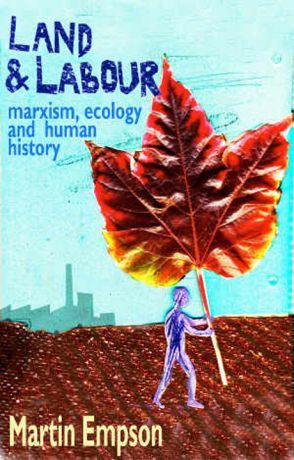Arts
You are here
Land and Labour

March 10, 2014
Land & Labour: marxism, ecology and human history by Martin Empson describes our historical relationship with nature, and how that relationship has dramatically changed as a result of how society is organized. Empson also explains why, in spite of already possessing the technology to solve the current ecological crisis, little is being done.
Most groups of early humans were hunter-gatherers with what Empson describes as a collective social approach based on sharing and communal support. Hunter-gatherers usually lacked a permanent leader like chiefs or kings. Inequality would lead to fewer resources for the whole group in order to provide more for those nearest to the leader. Without this way of organizing they likely would not have survived food shortages.
Class society
It was the unpredictability of the food supply that led hunter-gatherer societies to develop agriculture, even if only part-time. While Indigenous groups in the Americas and elsewhere maintained more egalitarian societies, other groups saw the transition to agriculture followed by the appearance of inequality as class societies developed. It was maintaining a food surplus that allowed certain individuals to “form a social class which controlled a part of society’s wealth”. This led to the development of the state and the exploitation of people's labour to produce wealth for their rulers.
The switch from the hunter-gatherer lifestyle to an agriculture-based one did not lead inevitably to the development of class society and industrial capitalism. Empson provides examples of societies that maintained collective organization and a more sustainable relationship with nature until contact with European colonists, one being the Bemba people of Zambia with their sustainable system of slash and burn crops and permanent gardens. After European colonization began in the 1880s, these methods were suppressed and the Bemba villages faced hunger as new farming methods were imposed.
England’s path to industrial capitalism was rooted in the enclosures organized by the ruling class that forced people from their land and into the growing urban centres to work in factories. The countryside was turned into a source of cash crops, wood from forests, coal and metals, and animals – nature came to be seen as a source of wealth. A strength of this book is its systematic and clear explanations of often complex processes. This is especially so in this section, where Empson explains the consequences of this new relationship with nature and how it has led to and exacerbated the environmental crisis of today.
As Marx wrote, under capitalism nature came to be seen as “an object for humankind, purely a matter of utility; ceasing to be recognized as a power for itself.” Capitalism is based on competition in order to increase the accumulation of wealth in the short-term, so the impact on the environment over years or decades cannot be taken into consideration. This economic system is not concerned with what is needed, but with the value of things once they are sold.
System change, not climate change
Empson spends the final part of the book outlining why the struggle to halt the ecological crisis – primarily the fight against fossil fuel use and extraction – directly confronts how capitalism works. It becomes clear why it will be such a challenge, but also why it is absolutely necessary.
There has always been climate change on Earth, plunging it at times into ice ages and into warmer times with no ice at all. However, this happens over geologic time, that is, over thousands and millions of years. Since the Industrial Revolution, the amount of temperature increase on land and water as well as the amount of carbon dioxide in the atmosphere has increased so dramatically that scientists agree it can only be due to our burning fossil fuels. To protect their profits, oil companies have launched campaigns to lobby governments and confuse the debate on climate change. They have seen success with this. For example, the UK government in 2012 cut subsidies for renewable energies and has encouraged the fracking industry in the country.
After reading chapters about the environmental destruction required by capitalism as it developed and since, Empson ends the book with a hopeful look at a future sustainable society under a system not focused on maximizing profit. Cities redesigned, along with distribution networks for industry and agriculture. Renewable energy prioritized over fossil fuels. Rationally planned production and reduced waste levels. Democratic decision-making processes involving the majority, not the minority.
As Land and Labour shows, the only solution to the current environmental crisis is a revolutionary change to the way the world is organized. Capitalism cannot be modified; it is fundamentally incompatible with sustainability. It must be replaced with a system that uses nature’s resources in a rational manner, with the future health of humanity and the planet as its priority.
If you want to arm yourself with ideas to build a movement for a world where we live in a sustainable interaction with nature, read Land and Labour, and then pass it on to your friends.
Land & Labour: marxism, ecology and human history is available from Bookmarks
Section:










